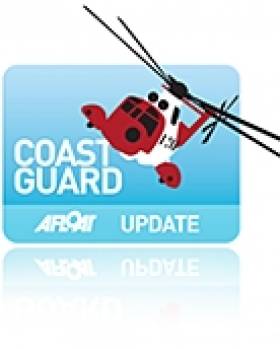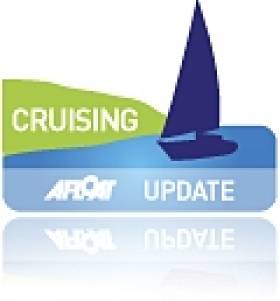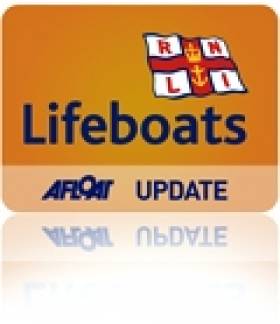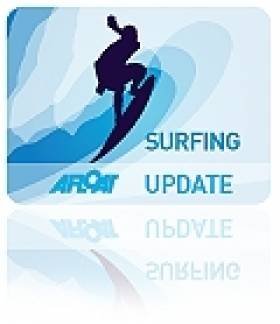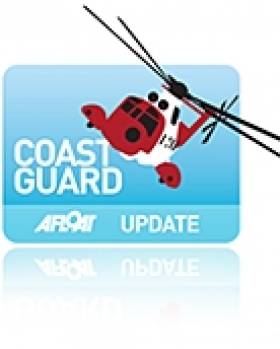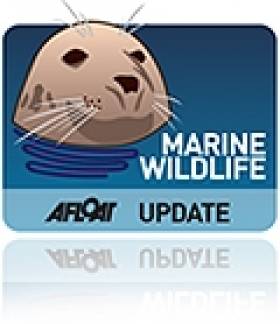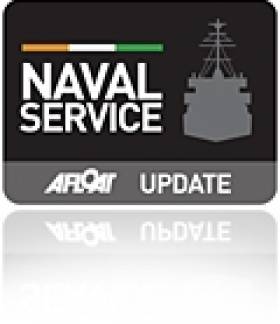Displaying items by tag: Coast
Speaking today, Minister for Transport Leo Varadkar TD said: This invitation to Achill Coast Guard Unit is an acknowledgement of the life-saving work that this Unit (and indeed all our Volunteer Units) around the country are engaged in every day of the year. Every day, these people selflessly risk their own lives to save others in all weathers, day and night, often in very dangerous conditions. This invitation is in recognition of their work and is an indication of the high esteem in which our Coast Guard Units are held internationally."
Achill Island Coast Guard Unit is made up of 24 volunteers who carry pagers and are available on 15 minutes' notice day and night 365 days a year. In August 2009 the Unit took part in a search and rescue operation for a person who fell into the Atlantic Ocean while fishing off the rocks near Achill Island. In response to this incident, the Achill Coast Guard rescue boat was launched together with local RNLI Ballyglass Unit and the Sligo Coast Guard helicopter during very hazardous weather conditions. The casualty (a Mr. Patrick Williamson) who amazingly stayed afloat swimming in high seas for over an hour was successfully rescued and spent 5 days in intensive care following his ordeal in the sea.
On making a full recovery, Mr. Williamson nominated Achill Island Coast Guard Unit for a National Courage Award. Previous recipients of this honour include the Irish Army (for peacekeeping duties) and former Taoiseach Mr. Bertie Ahern (for his involvement in the peace talks in Northern Ireland).
Director of the Irish Coast Guard, Mr. Chris Reynolds today said: "The Achill Coast Guard Unit is well-deserving of this honour and I congratulate them on being part of this special event. It is a great recognition of the standard and quality of service the Coast Guard provide and I thank Mr. Williamson along with all who helped make this happen for inviting them to take part in this special event."
2011 Irish Coast Sailing Directions Published
The Irish Cruising Club's acclaimed Sailing Directions, in two volumes, offer comprehensive coverage of the entire coast of Ireland, and their price has recently been reduced by £10.00 to £27.50 each (€32.50).
These are the only cruising guides for the Irish coast to be frequently and comprehensively updated, with corrections available free at www.irishcruisingclub.com.
The 310 page South and West volume was reviewed in Cruising magazine, Sept 2010: "If you are intending to cruise these coasts, or even if you are only thinking of doing so, it is essential. As Sailing Directions they are well-nigh perfect."
Written, edited, designed and printed on the island of Ireland, these handsome hardback books are carried as an aid to navigation and pilotage by the Irish Naval Service, the Irish Coast Guard and the Commissioners of Irish Lights, and they are used as a reference source by the UK Hydrographic Office.
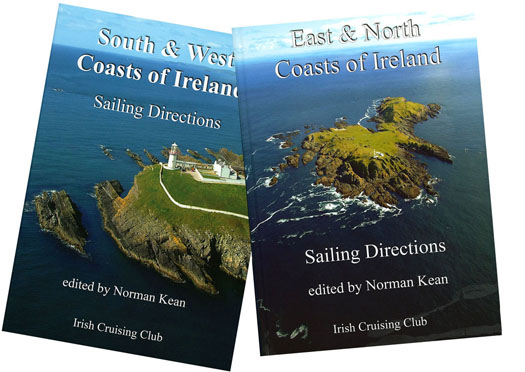
ICC SDs are available from chandlers and booksellers, and are distributed in Great Britain and the rest of the world by Imray, and in Ireland by Todd Chart Services. East and North Coasts Directions ISBN 978 0 9558 199 1 9; South and West Coasts Directions ISBN 978 0 9558 199 2 6.
Howth Lifeboat Rescues Three Vessels
The Inshore Lifeboat (ILB) was just returning to the safety of the harbour with two motorboats in tow, when the larger All Weather Lifeboat (ALB) was requested to the aid of a fishing trawler that had also experienced technical failure.
The second motorboat under tow by the voluntary ILB crew suffered engine failure whilst attempting to assist the first stricken craft. They had just reached the harbour mouth when the alarm was raised by a fishing trawler in similar circumstances.
The voluntary crew then transferred to the ALB and went to the rescue of the fishermen. All vessels were towed safely back to Howth harbour.
Patrick Brown, voluntary crewmember for Howth RNLI said:
"Luckily weather conditions were fair this evening, allowing for a speedy recovery of the boats that were in difficulty. However the light was fading at the time of the incidents, highlighting the importance of having safety flares for both commercial and pleasure craft alike. Charitable donations from the public make it possible for the RNLI to continue rescuing those in danger at sea"
Related Safety posts
RNLI Lifeboats in Ireland
Safety News
Rescue News from RNLI Lifeboats in Ireland
Coast Guard News from Ireland
Water Safety News from Ireland
Marine Casualty Investigation Board News
Marine Warnings
Cork Surfers Brave More Than The Cold!
There'a always a sliver lining around our coast. Whats a problem for some can be turned to advantage for others. A reef that sailors avoid during racing on coastal courses from Royal Cork presented the perfect setting for some Cork Harbour surfers at the weekend writes Brian Carlin.
A local hazard, the reef is situated approximately a mile west of the entrance to Cork Harbour, dangerous at high tide as most of the reef is immersed. SCROLL DOWN FOR IMAGES.
Surfers took advantage of the direct southerly swell, the surfers, Mark Barry, John Powell and Brian Hartnett, explained only in these conditions is the reef surfable. The trio enjoyed the best of the January sunshine and gave the shoreline spectators a show worth watching. Photos by Brian Carlin.
Dwyer's Island ‘A View From Above’
Dwyer is a member of the Irish Cruising Club and has achieved much recognition for his contribution to appreciation of the Irish coastline and countryside.
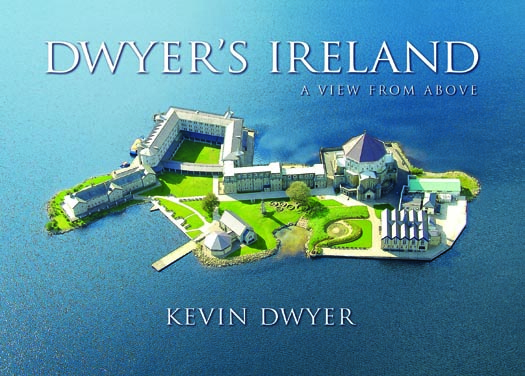
Dwyer's Island 'A View From Above' was published in October 2010 by Collins Press www.collinspress.ie/ and is Priced: €14.99 / £12.99
Coast Guard Urges Public Not to Go Out on Exposed Piers
The Irish Coast Guard service today issued an important warning to the public about high winds, gales and flooded areas. This warning comes following a weather warning and a strong gale warning issued by Met Eireann today. Southwest winds veering westerly will strengthen during this afternoon with stormy conditions becoming widespread.
Speaking today, Chris Reynolds Director of the Coast Guard said: "The public is strongly advised not to go out on exposed coasts, cliffs, piers, harbour walls, beaches, promenades or any other coastal areas. The principal dangers from this weather system will be due to gusts of 100 to 140 km/hr expected with the most severe in exposed parts of Ulster and Connacht. Showers will be heavy and thundery at times merging to give longer spells of rain in the north. Highest temperatures 9 to 11 degrees. Huge waves can be whipped up by high seas. These waves can pose hazards to anyone close to the shoreline. In coastal waters, rough seas are often the cause for capsizing fishing vessels. Some of these accidents can take place so quickly that there is no time for the crew to send out distress signals."
He continued: "Do not attempt to cross at fast running river or flood water fords as they may be stronger and deeper than you think. Flooded urban areas may contain many hazards, not least of which include submerged open manholes and downed power lines. The combination of tides, forecasted gale warnings for the next day or so, high sea conditions and swollen rivers may result in very dangerous conditions. Remember to monitor weather broadcasts when travelling and heed the advice of the RSA on road use during severe weather and high winds ."
Specific advice from the Coast Guard today is:
· Stay away from the shoreline and do not engage in water sports;
· Owners of small vessels and fishing vessels in coastal waters should seek shelterand secure them properly with moorings;
· Ships in the open sea should take heeds of weather forecasts and warnings and avoid the sea area with the most treacherous conditions.
Mr. Reynolds ended by saying: "If you do see someone in difficulty in the sea, on the shore, cliffs, lakes or rivers dial 999 or 112 and ask for the Coast Guard. "
Killer Whales Spotted off Kerry Coast
The Irish Whale and Dolphin Group (IWDG) spotted killer whales off the coast of county Kerry during an offshore survey last weekend. The killer whales crossed within two metres of the bow of the research vessel, others swam just beneath the surface keeping a parallel course with the surveyors.
The sighting of an adult pod is a rare encounter in Irish waters. 2010 has been a good year for killer whale sightings here with 14 validated records to date.
IWDG surveyors were able to photograph the whales and have sent the findings to expert researchers in the University of Aberdeen. It is understood these are new animals, not previously catalogued during the past few years of surveying killer whales in the North East Atlantic.
More on the sightings HERE.
Killeen Rejects Call Not to Cut Coastal Patrols
The Irish Coast Guard (IRCG) (Garda Cósta na hÉireann) is part of the Department of Transport.
All the latest Irish Coast Guard news is here.
The Irish Search and Rescue Region, which includes most of the Republic of Ireland and parts of Northern Ireland, is the area over which the coast guard has authority. This area is bounded by the UK Search and Rescue Region.
The Coast Guard is responsible for:
– Search and Rescue
– Marine communications network
– Marine safety awareness
– Mountain and Cave Rescue
Pollution and Salvage response in the marine environment (the Marine Rescue Co-ordination Centre [MRCC] in Dublin coordinates all pollution and salvage control in the Irish Exclusive Economic Zone [EEZ]).
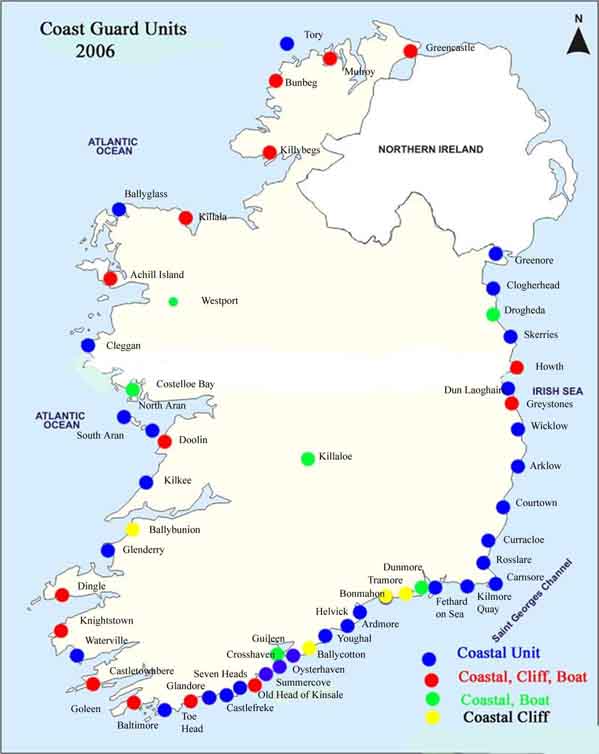
Note that not all Irish Coast Guards have enforcement powers – only some officers under warrant.
The Coast Guard (Garda Cósta) does not form part of the Irish Defence Forces, rather it operates as an agency of the Department of Transport under the Maritime Safety Directorate. The Maritime Safety Directorate comprises two main sections, the Maritime Safety and Marine Environment Division (MSED) and the Marine Survey Office (MSO). The Marine Survey Office also includes the Marine Radio Affairs Unit (MRAU). The Mercantile Marine Office (MMO) also works under the Directorate.
- The Maritime Safety and Marine Environment Division is responsible for maritime safety, security policy and legislation (including leisure safety), aids to navigation and corporate governance of the Commissioners of Irish Lights and marine environment protection issues.
- The Marine Survey Office deals with the inspection, survey, certification and licensing of vessels and vessels radio equipment; the examination and certification of seafarers competencies; enforcement of standards by way of audits on organisation and facilities and prosecutions for breaches of regulations.
While in some jurisdictions they are the responsibility of the Coast Guard, in Ireland, fisheries patrols are carried out by the Navy and drug smuggling patrols by Customs, the Gardaí and the Navy. However, all the above government services can at any time request assistance from each other when needed.
(The above information and image courtesy of Irish Coast Guard)
Irish Coast Guard, MRCC Dublin, Coast Guard Headquarters, Department of Transport, Leeson Lane, Dublin 2. Tel: 01 678 2303, Fax: 01 678 3459



























